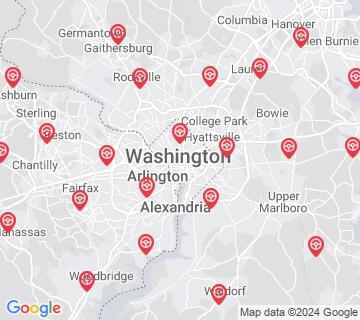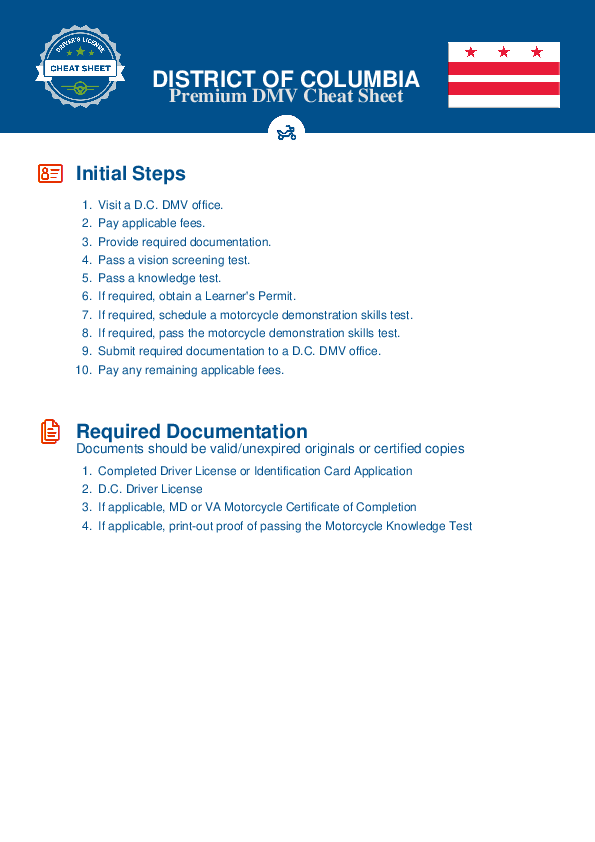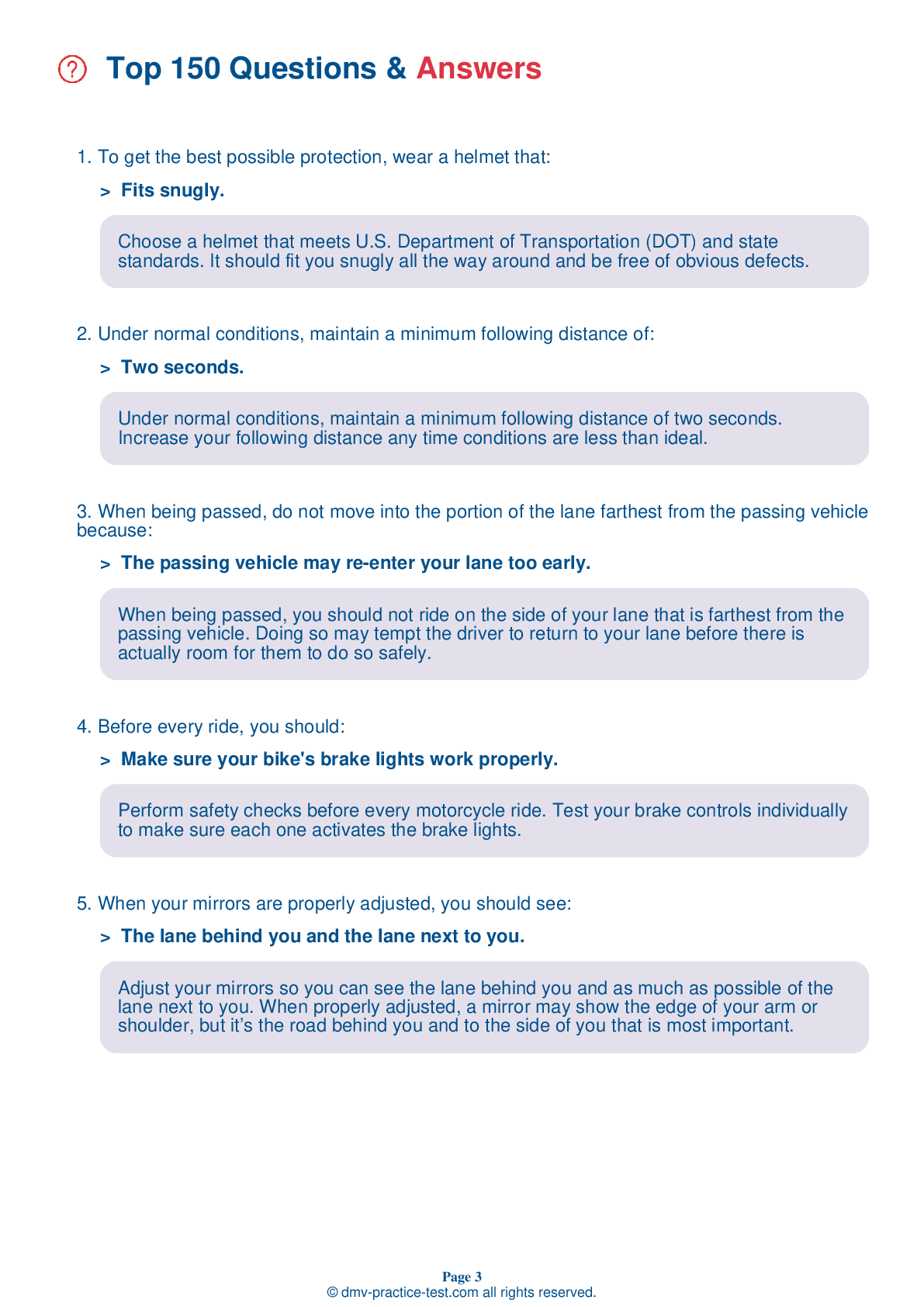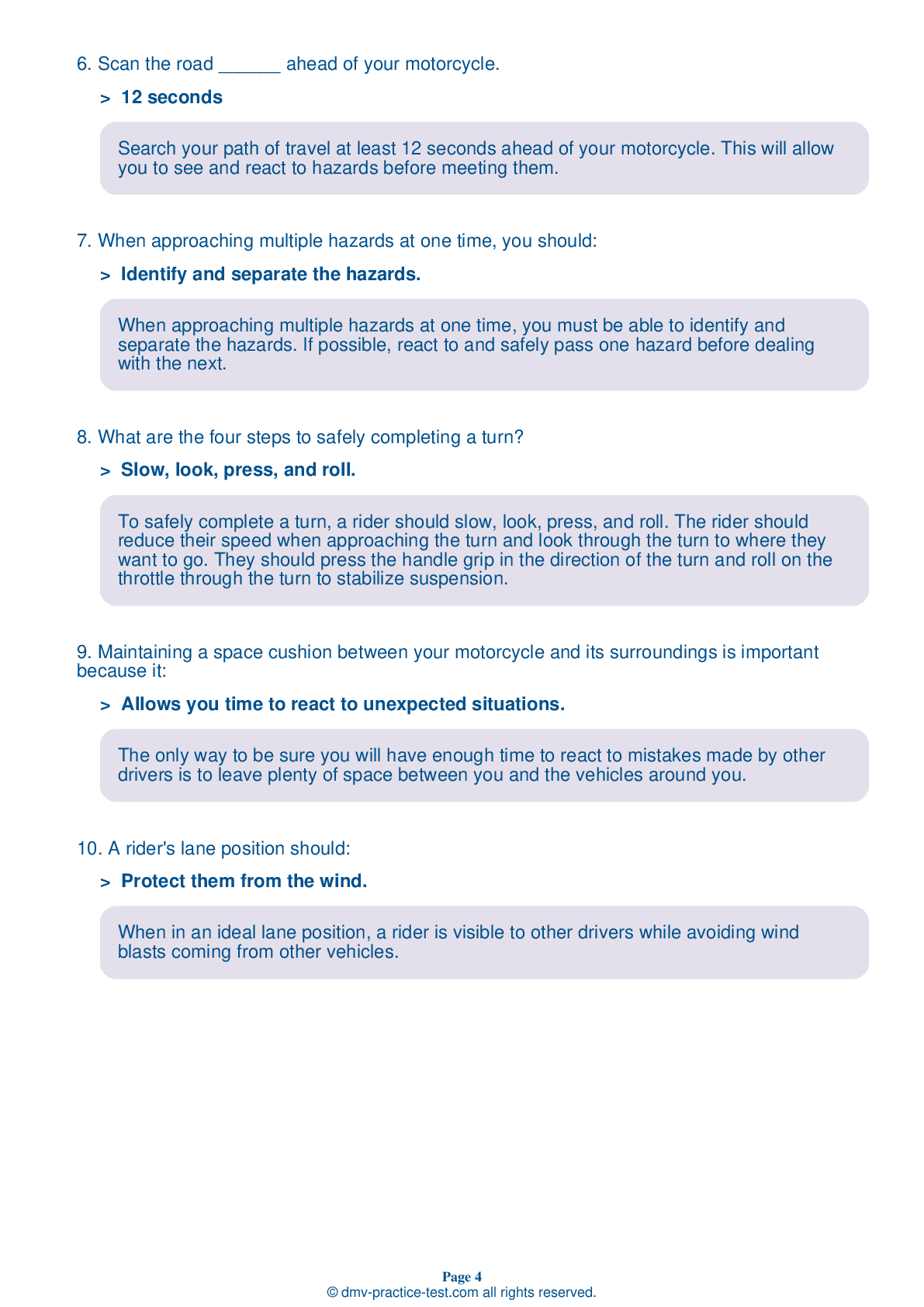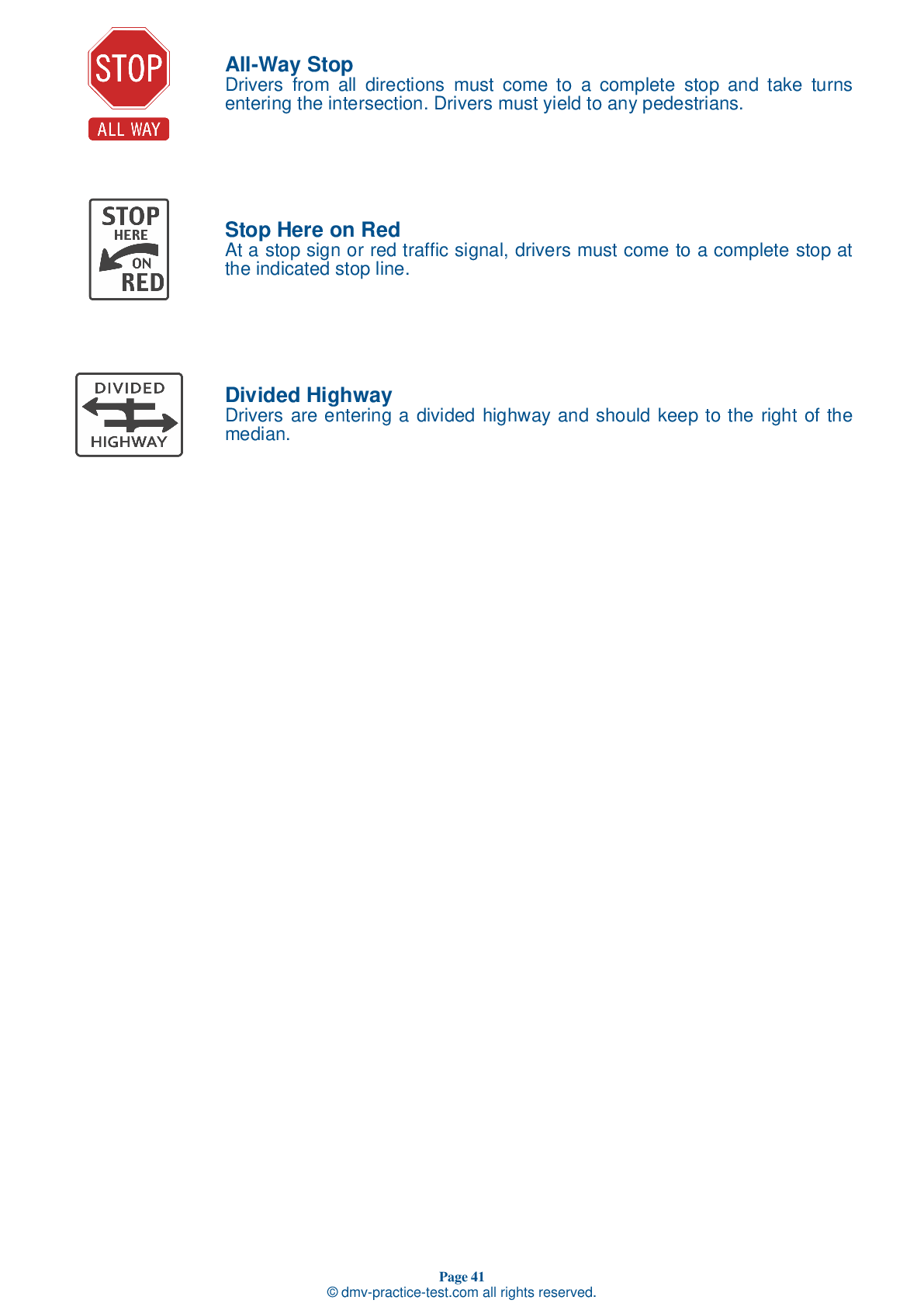DMV Permit Test #10
Motorcycle Test | License DC 2026 | FREE Online Practice! #10 Page 2 of 4
Take this FREE motorcycle test (license in DC 2026) to check your knowledge of the road rules. To improve your results, download a motorcycle handbook online, study theory, and practice for free on our website. Still worried about how to get a motorcycle license in District Of Columbia in 2026? Check our website for more sample tests, train as much as possible, and boost your grades!
25
20
16
7 . Riders who do not wear helmets while riding are ________ to die in a crash than riders who do wear helmets.
Just as likely
No matter the speed, riders who are not wearing helmets are three times more likely to die from head injuries than riders who are wearing helmets at the time of a crash.
8 . If your motorcycle begins to weave while you are riding over rain grooves or bridge gratings, you should:
Ride on the shoulder instead of on the grooves.
The weaving motion that occurs when a motorcycle rides over rain grooves or bridge gratings is generally not dangerous. If you experience weaving when riding over one of these surfaces, simply relax and proceed straight across the grooves or gratings at a steady speed. Trying to compensate for the weaving motion by zigzagging is more dangerous than riding straight.
9 . In general, when riding at night, your headlight should:
Alternate between high beam and low beam settings.
Using your high beam headlight will help you see and will help other drivers see you. Use your high beam headlight any time you are not riding behind or approaching other vehicles.
10 . Waiting for one hour to ride after having one drink:
May not entirely remove the effects of alcohol from your body.
On average, a person's body can eliminate the alcohol content of about one drink per hour. The amount of time required to lower a person's blood alcohol content (BAC) can vary, so it is safest not to operate a motor vehicle after consuming any amount of alcohol.
11 . This road sign means:
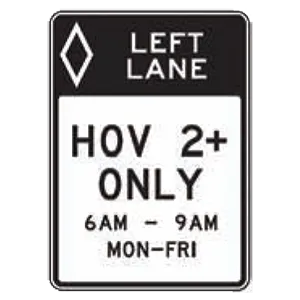
Drivers in both lanes are responsible for merging smoothly.
This sign marks a high occupancy vehicle (HOV) lane. HOV lanes are reserved for use by buses and vehicles with a driver and one or more passengers, as indicated on the sign.
12 . When carrying a passenger or cargo:
It may take less time to accelerate and stop.
Because of the additional weight added by cargo or a passenger, motorcycles may take longer to accelerate and stop than they would if only transporting the operator.
Search the best driving school in your neighbourhood
2026 District Of Columbia | Frequently Asked Questions
To acquire a motorcycle driver's license in the District of Columbia, you must first obtain a motorcycle permit. This requires passing a knowledge test. After practicing with the permit, you can apply for a license, which involves passing a motorcycle skills test. Alternatively, completion of an approved motorcycle training course can bypass these requirements.
In the District of Columbia, the minimum age for obtaining a motorcycle driver's license or endorsement is 18 years old. However, those who are 16 or 17 can apply if they have parental or guardian consent, have completed a motorcycle training course, and meet other licensing requirements.
Yes, you do. In the District of Columbia, you must have a motorcycle (Class M) endorsement on your driver's license to legally operate a motorcycle. To obtain this, you must pass a knowledge test, motorcycle skills test, and vision screening. Alternatively, completion of an approved motorcycle training course can waive the skills test.
To apply for a motorcycle driver's license in the District of Columbia, you'll need: a valid DC driver's license, proof of identity, proof of social security number, two proofs of DC residency, and a certificate of completion from an approved motorcycle training course if you want to waive the skills test.
Yes, you will need to take a written exam for a motorcycle license in the District of Columbia. This test covers topics such as basic motorcycle operation, safety practices, road rules, and traffic signs. It is designed to ensure that you understand the necessary knowledge to operate a motorcycle safely on the roads.
The motorcycle written test in the District of Columbia covers a range of topics including traffic laws, motorcycle operation and handling, road signs, and safe riding techniques. It also tests your knowledge on handling emergencies and mechanical problems. The questions are based on the information provided in the DC DMV Motorcycle Operator Manual.
No, in the District of Columbia, completing a motorcycle training course does not exempt you from the written test. The training course can only waive the riding skills test. You are still required to pass the written knowledge test to receive your motorcycle endorsement or permit.
To enroll in a motorcycle training course in the District of Columbia, you first need to find an approved course provider. Once you've chosen a provider, you'll need to register for the course, which typically involves paying a fee. The course will include both classroom instruction and hands-on training. Upon successful completion, you'll receive a certificate which can be used to waive the riding skills test at the DMV.
No, you do not need to own a motorcycle to take the license test in the District of Columbia. You can use any motorcycle that is registered, insured, and passes a safety inspection. If you're using someone else's motorcycle, you must have their written permission.
Yes, you can use a friend's motorcycle for the driver's license evaluation in the District of Columbia. However, the motorcycle must be legally registered, insured, and pass a vehicle safety inspection. Also, you must have written permission from the owner to use it for your test.
Yes, in District Of Columbia, specific motorcycle handling skills are tested during the driving exam. These skills include starting and stopping, turning and swerving, and quick stops. The exam also tests your ability to balance the motorcycle at slow speeds. It's crucial to demonstrate safe handling and control of the motorcycle throughout the test.
Yes, in the District of Columbia, new motorcycle drivers are issued a learner's permit before a full license. The permit has restrictions such as no passengers, no driving on highways, and only driving during daylight hours. After 30 days or completion of a motorcycle safety course, they can apply for a full license.
Yes, your District of Columbia driver's license with a motorcycle endorsement allows you to operate a motorcycle in other states. However, it's important to understand each state's specific rules and regulations concerning motorcycle operation, as they can vary. Always follow local traffic laws when traveling out of state.
Yes, in the District of Columbia, it is mandatory for all motorcycle riders and passengers to wear a helmet. The helmet must meet the U.S. Department of Transportation (DOT) Federal Motor Vehicle Safety Standard (FMVSS) 218. This law is enforced to ensure the safety of motorcycle riders and passengers.
In the District of Columbia, there are two types of motorcycle licenses: a motorcycle-only license and a motorcycle endorsement on a regular driver's license. The motorcycle-only license allows you to operate only motorcycles, while the endorsement allows you to operate both motorcycles and other vehicles, based on the class of your regular driver's license.
Yes, you can add supplementary endorsements to your motorcycle license in the District of Columbia. This allows you to operate different types of vehicles. However, each endorsement may require additional tests and fees. It's advisable to contact the District of Columbia Department of Motor Vehicles for specific details and requirements.
Yes, in the District of Columbia, the motorcycle written exam is available in multiple languages. This includes Spanish, Amharic, Chinese, French, Korean, Vietnamese, and others. However, it's advisable to confirm with the DMV about the availability of your preferred language before scheduling your exam.
One effective strategy to prepare for the motorcycle license test is to study the District of Columbia Motorcycle Operator Manual thoroughly. It covers all topics that will be on the test. Also, taking online practice tests can be very helpful as they simulate the actual exam and help you familiarize yourself with the format and type of questions asked.
Yes, in the District of Columbia, the Department of Motor Vehicles (DMV) offers the motorcycle written exam in several languages other than English. These include Spanish, French, Amharic, Chinese, Vietnamese, Korean, and more. However, it's recommended to confirm with your local DMV office about the availability of specific languages.
If you don't pass the motorcycle written test in the District of Columbia, you are allowed to retake it. However, you must wait at least three days before your next attempt. There's no limit to the number of times you can retake the test, but each attempt requires a new fee.
